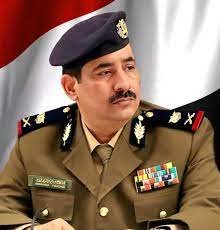
The Yemeni Ministry of Interior
Is a sovereign ministry that maintains the internal security of the Republic of Yemen.
Ministry Structuring
On February 21, 2013, a republican decree was issued to restructure the Ministry of the Interior, aiming to establish a national professional police apparatus, on scientific grounds, that implements the law accurately and rigorously, respects the freedom of citizens and preserves their dignity, and respects human rights and public and private freedoms, and seeks to provide the best services to citizens until It aims to gain their trust and cooperation in the prevention and control of crime after the trust relationship between the police and citizens was lost in the past years, as stated in the law. On this basis, and on the understanding (professionalism of police work) that it is complete impartiality and specialization in security practice, and away from narrow loyalties (tribal, clan, sectarian, racist, partisan and personal) and making loyalty to God and the homeland the main engine of police works under the rule of law
Vision
Excellence in performance to protect life and property and to establish security and tranquility
for a distinguished society with security and development at the level of the region
Mission
The ministry aims to maintain order, public security and morals, protect lives, honor, properties and freedoms, and in particular prevent and control crimes, and ensure peace and security for citizens, in cooperation and coordination with state authorities and agencies based on the constitution and the law.
Values
Respect Human Rights
Justice and Equity
Transparency and Integrity
Responsibility and Discipline
The strategic goals of the Ministry
Clarity of tasks and competencies and no overlap in functions
Belief in granting powers and moving away from centralization
Integration in all police work, taking into account specialization and responsibility
Belief in the necessity of oversight and accountability, and combating abuses in the police force, especially in dealing with citizens, their rights and freedoms, and combating corruption in all practices and procedures
Spreading the principle of (transparency) to provide an opportunity for all civil society organizations to be a supervisory body over the performance and behavior of policemen
Focusing on the task of achieving security and stability in the lives of citizens and in the homeland, as the basis for the efforts of the police and security apparatus
The unit of command, control, supervision and direction, and granting powers in each geographical framework to the first official
Creation of new departments and units in line with achieving the objectives required in the new structure
Achieving (national unity) to build the police apparatus, starting with admission to colleges or institutes, or conscription in camps, away from (centralization)
The effectiveness of the evaluation and overcoming errors and obstacles, then the continuous development of the police's performance and their technical and technical capabilities
Interior Minister

Major General Staff / Ibrahim Haidan
Ibrahim Ali Ahmed Haidan was born in 1972 in the governorate of Aden, specifically Al-Mualla, who received his primary and secondary education in its schools After completing his secondary studies, Ibrahim Haidan joined the Naval College and graduated with the rank of lieutenant with distinction, where he obtained the second rank in his class, which enabled him to continue in the college as a teaching assistant.
Major General Ibrahim Haidan deepened his career in the armed forces. He is one of the men who was apprenticed by the late late Brigadier General Muhammad al-Ghafuri, Chief of Staff of the Naval Forces and Coastal Defense in the People’s Democratic Republic of Yemen. He is also one of the students of the Naval College that was established after the achievement of Yemeni unity in 1990 Major General Ibrahim Haidan held many positions in the military field, since he graduated from the Naval School - the Naval College - until he became the chief instructor at the college, and assumed the responsibility of the college Major General Haidan joined an external course (command and staff) in the sisterly Sultanate of Oman, and after completing the command and staff course in the Sultanate of Oman, he was sent to participate in a qualification course in the United States of America Major General P.S.C. Ibrahim Haidan obtained a National Defense Fellowship certificate from the Supreme Military Academy in Sana'a. He is a member of the Presidential Committee for the Restructuring of Military Brigades in the Liberated Areas, as well as the Deputy Chairman of the Military Committee for the Implementation of the Riyadh Agreement Major General Ibrahim Haidan has deep administrative experience that he gained through his ascension in several major military positions and responsibilities to which he was appointed throughout his career, the last of which was his appointment as Deputy Director of the Office of the Supreme Commander of the Armed Forces and Security